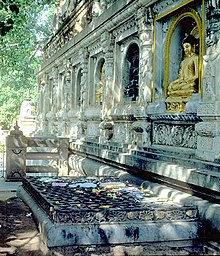Bodhimaṇḍa (Sanskrit and Pali) or daochang (traditional Chinese: 道場; ; pinyin: dàochǎng) is a term used in Buddhism meaning the "position of awakening". According to Haribhadra, it is "a place used as a seat, where the essence of enlightenment is present".[1]


Bodhimaṇḍas are regularly visited by Buddhist pilgrims, and some have gone on to become popular secular tourist destinations as well. In many forms of Buddhism, it is believed that bodhimaṇḍas are spiritually pure places, or otherwise conducive to meditation and enlightenment.
This Buddhism-related article is a stub. You can help Wikipedia by expanding it. |